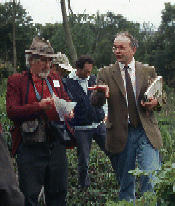Professor Melvyn Jones
 Oliver (left) with Professor Charles Watkins at a conference held at the University of Nottingham in 1996 to celebrate the twentieth anniversary of the publication of the first edition of Trees and Woodland in the British Landscape.
Oliver (left) with Professor Charles Watkins at a conference held at the University of Nottingham in 1996 to celebrate the twentieth anniversary of the publication of the first edition of Trees and Woodland in the British Landscape.
Professor Oliver Rackham (1939–2015), botanist, historical ecologist and landscape historian, died on 12 February at the age of 75. A brilliantly original researcher and writer, he inspired so many people, botanists, landscape and local historians (amateur and professional), conservationists and countryside managers, to look again with new eyes at the landscape, particularly woods, wooded commons and parkland landscapes as both a natural ecosystem and as the product of human management.
He first came to notice nationally with his book Trees and Woodland in the British Landscape (Dent, 1976). This was largely re-written to take account of further research for a second edition published in 1990. Praise for the first edition of the book was unanimous, the New Scientist proclaiming that he had ‘a gift for presenting solid information that kindles the imagination and stimulates the sense of curiosity… I haven't found its equal’. Moreover, Country Life said it was ‘…a masterly account … a classic of recorded field work and meticulous scholarship’. In addition, it was in the second edition of this book that he introduced the concept of pseudo-history, which as he pointed out had no connection with the real world and was made up of factoids that look like facts, are respected as facts and have all the properties of facts except they are untrue. Among the factoids he lists are that medieval England was still well wooded, that coke was used for smelting iron from the eighteenth century because there were no trees left and that the last remnants of ancient woodland were cut down during the two world wars.
In 1980, his magnum opus, the seminal Ancient Woodland: its history, vegetation and uses in England (Edward Arnold) was published. This ran to more than 400 pages and was re-published in a new edition in 2003 by Castlepoint Press. This was followed by another ground-breaking book in 1986, the monumental The History of the Countryside (Dent) for which he was awarded the Angel Literary Prize. Richard Mabey said it all in his review in The Times Educational Supplement: ‘Rackham has turned his inquisitive eye and incisive, iconoclastic pen to the wider countryside, and has produced a classic of scholarship and imagination’. Weidenfeld & Nicolson published an abridged full-colour illustrated version of the book in 2003.
Rackham also wrote two outstanding books on the Mediterranean landscape. In 1996, inspired by W.G. Hoskins' The Making of the English Landscape, with Jennifer Moody, he wrote The Making of the Cretan Landscape (Manchester University Press) and in 2003 with A.T. Grove, he wrote The Nature of Mediterranean Europe: An Ecological History (Yale University Press). I remember spending a week in Crete in 1998, supposedly on a birding and wild flowers holiday, but having just devoured Rackham and Moody's book on Crete I spent most days trying to photograph a goat up a prickly-oak ‘goat pollard’ that was so vividly illustrated in a line drawing on page 113.
Rackham was just as good when researching on a small scale as well as on the national or international scale. This is obvious whether he was compiling and writing a study of an individual wood, as in Hayley Wood, its history and ecology (Cambridge and Isle of Ely Naturalists' Trust, 1975), of a former royal forest as in The Last Forest: The Story of Hatfield Forest (Dent, 1989), or a small sub-region as in The Woods of South-East Essex (Rochford District Council, 1986).
It was not just in his major works that he made an outstanding contribution to knowledge and the changing of attitudes; this was also true of the articles that he contributed to journals over the years. For example, in 1979, he wrote a pioneering article in Landscape History entitled ‘Documentary Evidence for the Historical Ecologist’ in which he described at length the various types of documentary evidence that could be used to compile the history of a wood. He made what might now be regarded as the obvious point, but what at that time was quite novel, that: ‘Without such information it is impossible adequately to assess the importance of individual woods and woodland types or to draw up rational management schemes’. More recently, in 2004, he wrote a thought-provoking article in the journal Landscapes on pre-existing trees and woods in country house parks in which he illustrated the fact that the creation of parks had removed samples of countryside from the normal pressures of agriculture and preserved the trees, other vegetation and antiquities of the previous landscape.
In 2006, Rackham wrote Woodlands, the 100th volume in the New Naturalist Library (Collins). In his Foreword, he claims that he is a now a rather old-fashioned botanist and says that, ‘for good or ill, I haven't a particular theory to promote’. Don't you believe it; the book is as thought provoking as ever. His latest book was The Ash Tree (Little Toller Books, 2014) in which, among other things, he turned a critical eye on the globalised import–export trade.
To sum up: Oliver Rackham was a brilliant researcher and an extraordinarily influential communicator; he was inspiring, quirky (often in shorts, red socks and sandals), generous and opinionated (but his opinions were always worth listening to). He will be very greatly missed and his legacy will be immense.
